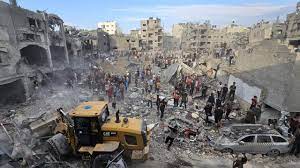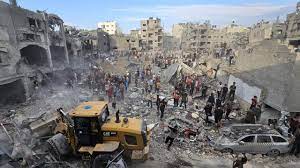
As the Israeli-Palestinian conflict continues to escalate, the only cancer treatment hospital in Gaza has been forced to shut down due to a severe fuel shortage, putting the lives of patients at risk. Meanwhile, Israel’s strikes on the Jabalia refugee camp have resulted in substantial Palestinian casualties, with UN human rights officials expressing concerns about potential war crimes. The situation in the besieged Gaza Strip remains dire, prompting international calls for a humanitarian pause in hostilities.
Amid this backdrop, more foreign nationals have made preparations to leave Gaza, following a deal involving Israel, Egypt, and Hamas. Israel’s offensive against Hamas militants has included airstrikes by land, sea, and air, with the aim of eliminating the Islamist group. Israel alleges that Hamas has killed 1,400 people, mostly civilians, and taken over 200 hostages.
The dire humanitarian conditions in Gaza have prompted concerns across the world, with food, fuel, drinking water, and medicine in short supply. Hospitals have been severely affected, with Gaza’s only cancer hospital forced to close due to fuel shortages. Israel’s reluctance to allow humanitarian convoys to bring in fuel, citing fears that it could be diverted for military purposes by Hamas, has added to the crisis.
Israel has stated that its recent strikes on the Jabalia refugee camp killed two Hamas military leaders, emphasizing that the group had command centers and other “terror infrastructure” intentionally located in and around civilian buildings, endangering Gazan civilians. In response, Gaza’s Hamas-run government media office reported at least 195 Palestinians killed in the two Israeli attacks on Jabalia, with 120 individuals still missing under the rubble and 777 more wounded.
United Nations human rights officials have voiced concerns that these attacks may constitute war crimes due to the high number of civilian casualties and the extensive destruction in the Jabalia refugee camp.
U.S. Secretary of State Antony Blinken is set to depart for his second visit to Israel in less than a month. His visit aims to express solidarity with Israeli officials, including Prime Minister Benjamin Netanyahu, while emphasizing the need to minimize Palestinian civilian casualties. Blinken will also stop in Jordan to underscore the importance of protecting civilian lives and address the growing concern in the Arab world regarding the forced displacement of Palestinians in Gaza.
In the U.S., the House of Representatives is considering a bill providing $14.3 billion in aid for Israel, although it faces opposition in the Democratic-controlled Senate and a potential veto threat from the White House. President Joe Biden is seeking a broader $106-billion bill that encompasses funding for Ukraine, border security, humanitarian assistance, and support for Israel.
The conflict in Gaza has reached a devastating toll, with the Gaza health ministry reporting that at least 8,796 Palestinians, including 3,648 children, have been killed by Israeli strikes since October 7. The situation remains critical, and international efforts are underway to address the growing humanitarian crisis in the region.
Sources By Agencies



